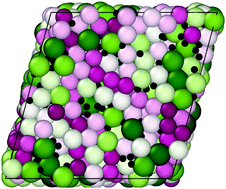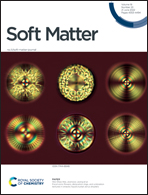Rheological response of a glass-forming liquid having large bidispersity
Abstract
Using extensive numerical simulations, we investigate the flow behaviour of a model glass-forming binary mixture whose constituent particles have a large size ratio. The rheological response to applied shear is studied in the regime where the larger species are spatially predominant. We demonstrate that the macroscopic rigidity that emerges with increasing density occurs in the regime where the larger species undergo a glass transition while the smaller species continue to be highly diffusive. We analyse the interplay between the timescale imposed by the shear and the quiescent relaxation dynamics of the two species to provide a microscopic insight into the observed rheological response. Finally, by tuning the composition of the mixture, we illustrate that the systematic insertion of the smaller particles affects the rheology by lowering of viscosity of the system.



 Please wait while we load your content...
Please wait while we load your content...